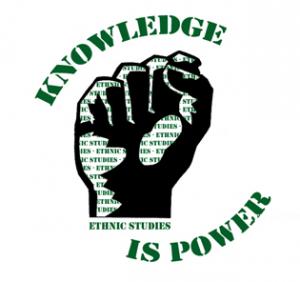Week 10, October 31st

Precious Knowledge
However, things take a turn when Tom Horne, TUSD superintendent, calls for the discontinuation of all ethnic studies programs through a statewide bill. He argues that the program indoctrinates students through an anti-American agenda and opposes splitting up students based on their race. The rest of the movie follows the legislation of this bill through Arizona House and Senate. Students are enraged that the program that helped them see a purpose for their education is being shut down by officials who had never even set foot in their classes. Along with their teachers, students protest the bill on multiple occasions. Ultimately, the bill passes and the ban on ethnic studies classes is enforced in Tucson schools.
We’ve discussed in class how the actions of those in power are a direct result of their desire to stay in power, and they fear any type of revolutionary thought among marginalized groups. This documentary provides another example of the privileged few taking measures to oppress racial groups at the first hint of uprising. While it was frustrating to watch such an important program be shut down, it seems as though the ban of this program sparked a national movement for other school districts to start implementing ethnic studies classes. Had the students in this video given up and accepted defeat rather than fight for their education, this ban might not have gained so much national attention. This is an important film that all educators should see. It enforces the importance of planting the seeds of “precious knowledge” within our students-- the lessons of their cultural histories and the skills needed to advocate for themselves.


I also read the article you linked - and thought this comment really helped indicate WHY knowledge is needed ... "They were doing a very simplistic application of Karl Marx's dictum: All of history is the struggle between the 'oppressor' and the 'oppressed,' " Huppenthal says. "And they were going to identify whites as oppressors and Hispanics as the oppressed."
ReplyDelete"going to"... again, this knowledge of REAL history and reality of current events etc... is important for all of our students. I also think that Huppenthal really fears an overthrow of "white government", but in my eyes, the more all students (and people) can be honest about the systems in place, the more gradual and real change can happen -- as opposed to continuing to oppress until it actually erupts into an "overthrow" revolution!
What Huppenthal says in the article you linked, that"To teach kids that they're victims and they can't get ahead in life because somebody's holding them down, I think it's a mistake" is exactly the kind of denial that perpetuates white supremacy. A statement like that comes from someone who will never be willing to admit that they have ever been wrong. For years, our educational system has made white people out to be the heroes, the ideal. It's only recently that we have begun to look more closely at important historical figures and have stopped romanticizing them. In class we talked about how many places are celebrating Indigenous People's Day rather than Columbus Day, and I think this is an important step. Huppenthal was so offended that the class identified Benjamin Franklin as a racist, but anyone who has read his autobiography knows that he was far from perfect. As people become more educated, they start to see that the 'perfect' America that we know has actually been a horrific place for many, and this is what lawmakers are so keen to keep people from finding out.
ReplyDeleteI focused so much on Gilbert during the film, how he had this poor relationship with school and finally he finally felt like education meant something. He wanted to learn more. It was extremely frustrating hearing Horne tell media and the court that ethnic studies was anti-American when these course were based on understanding and respect.
ReplyDelete